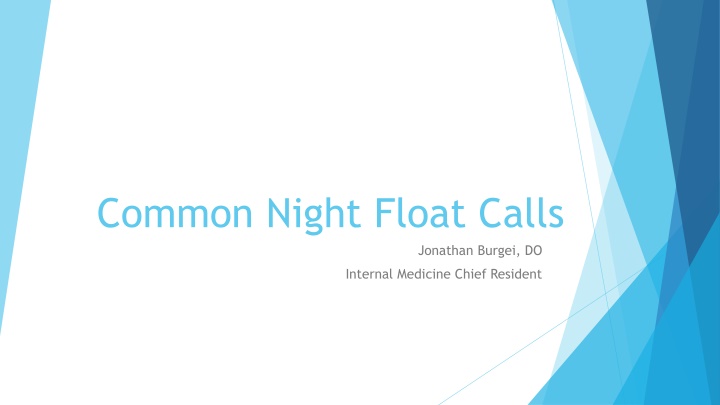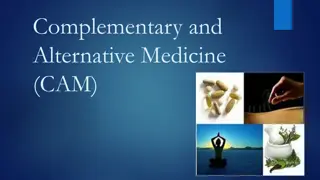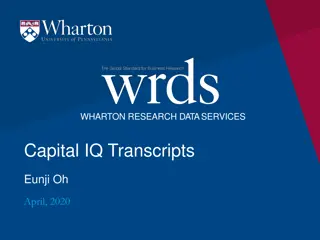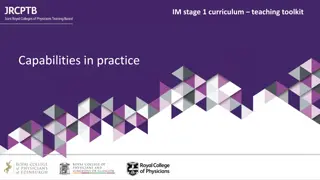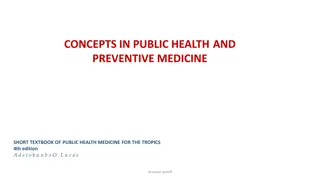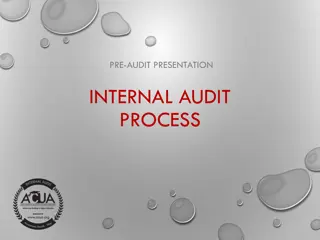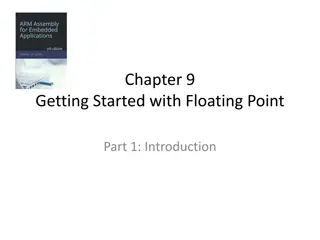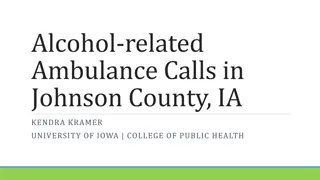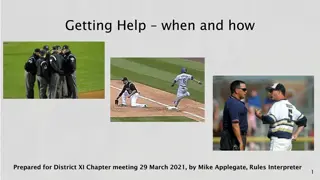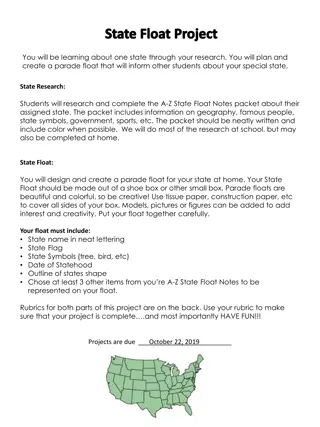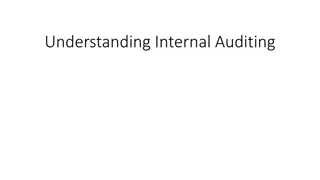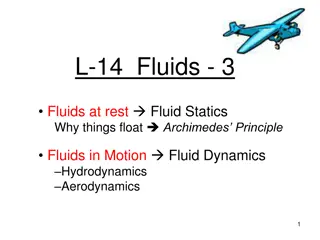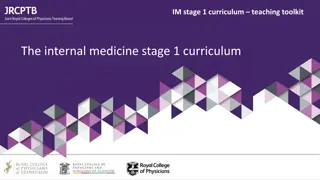Common Night Float Calls in Internal Medicine: An Overview
Night float responsibilities for Internal Medicine Chief Residents involve responding to all medical team patient pages, documenting calls, and participating in emergent situations like code blues and stroke teams. Specific scenarios like chest pain and abdominal pain require prompt assessment and differential diagnosis. The management includes ordering necessary tests and involving senior physicians when needed. The importance of diagnosing pain causes and treatment options are also highlighted.
Download Presentation

Please find below an Image/Link to download the presentation.
The content on the website is provided AS IS for your information and personal use only. It may not be sold, licensed, or shared on other websites without obtaining consent from the author.If you encounter any issues during the download, it is possible that the publisher has removed the file from their server.
You are allowed to download the files provided on this website for personal or commercial use, subject to the condition that they are used lawfully. All files are the property of their respective owners.
The content on the website is provided AS IS for your information and personal use only. It may not be sold, licensed, or shared on other websites without obtaining consent from the author.
E N D
Presentation Transcript
Common Night Float Calls Jonathan Burgei, DO Internal Medicine Chief Resident
Night Float 6:30 PM ~ 7:30 AM Meet in resident lounge Responds to pages regarding med team patients Document ALL calls (even minor issues) Responds to ALL code blues, stroke teams, rapid responses Always go and see the patient if an issue arises Unsure what to do Senior resident (you are not alone on nights!) Morning report: Brief run of night events / notable encounters
Chest Pain Nothing Life threatening (ACS) When called, ask about Symptoms VITALS Stable vs Crashing Orders: STAT EKG, CXR, ABG (hypoxia), troponin Review chart (PMHx, Labs, Past EKG, Vitals) Tell senior and go see patient!
Differentials Emergent : (calling senior, cardiology fellow) Less acute ACS: STEMI, NSTEMI, unstable angina Stable Angina Dissection Pneumonia PE Pericarditis Pneumothorax Cocaine/meth Cardiac tamponade Esophageal spasm / GERD Esophageal rupture Costochondritis Hypertensive Emergency Panic attack/anxiety
Abdominal Pain History History History Location / radiation? Groin (renal colic) vs Back (pancreatitis) Onset, frequency, duration Steady (pancreatitis) vs sudden (peritonitis) Aggravating / alleviating factors After meals (chronic mesenteric ischemic)
Labs Glucose (DKA), Lipase, triglycerides, EtOH, Lactate, Beta-HCG, UA, consider troponin / EKG Imaging Abdominal X-ray, US, CT scan, bladder scan
Pain Diagnosing the cause of pain is essential! Approach; Review H&P / Progress notes Review Handoff! Evaluate the patient Vital signs Physical exam Lab abnormalities
Treatment options Non-pharmacologic options Ice pack Heating pad TLC
Treatment options Step up treatment Lidocaine patch localized, MSK Topical Capsaicin neuropathic pain Scheduled / PRN acetaminophen (max 2g/24 hours for hepatic impairment or 4g/24 hours otherwise) NSAIDs younger patients, MSK / arthritis, low comorbidity, with meals / PPI Neurontin neuropathic pain, DM2, post-herpetic neuralgia Toradol Nephrolithiasis / renal colic, migraines (only for <5 days d/t AKI)
Treatment Options Step up treatment Narcotics
Take home points Acknowledge / empathize Even if pain seeking, they believe they are in pain Be strong, you will be yelled at a few times . Start low and escalate When in doubt, ask your senior
Immediate Questions Patient status LOC, Neurological status, vitals, blood sugar Circumstances Admission diagnosis, hx of trauma Symptoms SOB, CP, palpitations, pre-syncopal symptoms, syncope PMHx Dementia, DM type II, CAD, stroke Medications Narcotics, sedatives, anti-cholinergics
Physical assessment Full physical / neuro exam Look for signs of trauma Especially head Can call rapid response to place c-collar Orthostatics
Cause Extrinsic Poor lighting, wet floors, tethered to lines Intrinsic Visual impairment / deconditioning Neuro: Seizure, stroke, delirium Cardiac: Arrhythmia, MI, vasovagal, orthostatic Metabolic: Hypoglycemia, electrolyte, uremia Infection: Delerium Toxin: EtOH withdrawal, benzos
What to do? Labs: BMP, CBC, UA, Glucose, Coags, Tox screen EKG Imaging X-ray CXR CT head
Plan Treat underlying cause Remove offending agents (Meds, lines, tethers) Treat infection, electrolytes, seizure Prevention Sitter Delirium protocol Fall precautions
Agitation Delirium protocol, sitter, avoid restraints if possible Medications Haloperidol Quetiapine Olanzapine Avoid benzodiazepines Pain control May require dexmedetomidine ICU
Hypertension Urgency SBP > 180 or DBP > 120 NO end organ damage Emergency SBP >180 or DBP > 120 End organ damage HA / Dizziness, Nausea, vomiting, seizures, CP, SOB, blurry vision
Exceptions include strokes!
Treatment Check MAR Home BP meds PRN IV meds IV Hydralazine IV labetalol Rapid reduction may MI or cerebral ischemic
Shortness of breath Questions to ask nurse Vital signs Oxygen saturation Mental status Open Epic PMHx Reason for admission Recent chest imaging? DNR status Would they want to be intubated if needed?
History and Physical Exam Onset Duration Aspiration? Fever / Chills Cough Chest pain? Allergies
Lab work CBC, BMP ABG STAT CXR STAT EKG STAT Troponin Treatment Aerosols +/- Diuretics NC Non-rebreather HFNC NIV Intubation
Hypotension Ask for all vitals, not just BP Repeat vitals while you are on your way (different arm) Go see patient and get senior
Causes of hypotension Distributive shock: Septic Cardiogenic: HF Hypovolemic: Fluid loss Obstructive: PE .tension pneumothorax
Initial Evaluation Look at patient Symptoms? Signs of bleeding? Signs of infection? Physical exam Current Vital signs Telemetry? Mental Status? Signs of infection? EPIC / Chart review Vitals trend Reason for admission PMHx Recent medications (BP meds, Lasix, NPO?)
Initial Management Consider initial fluid bolus (caution in ESRD and HF patients) +/- Albumin Labs: CBC, lactic acid, procalcitonin, troponin, ABG, blood cultures, type and screen Imaging: EKG, CXR, CTA-chest
Management Treat underlying cause of hypotension Sepsis Aggressive fluid management (30cc/kg), cultures, broad spectrum antibiotics May require pressors (levophed through peripheral IV temporarily) ICU Cardiogenic EKG and troponin. Assess for arrhythmias / MI CCU Hemorrhagic IVF first while waiting for type and screen / blood ICU evaluation
Summary Go see the patient Document everything your thinking and doing Talk with your senior, you are not alone!
